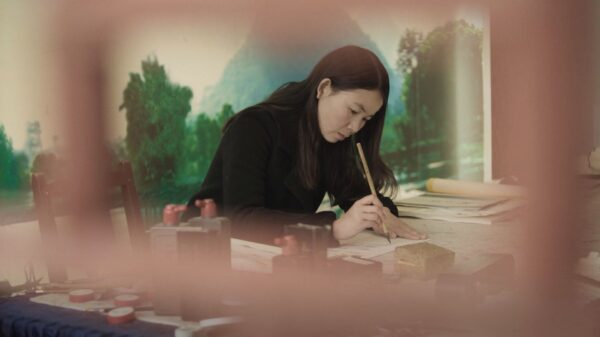
FOR THOUSANDS OF YEARS, WOMEN IN CHINA WERE BORN TO OBEY THEIR FATHERS, HUSBANDS AND SONS.
FORBIDDEN TO READ AND WRITE, THEIR VOICES WERE SILENCED. MOST LEFT NO RECORD OF THEIR LIVES.
Nushu has many levels, is a secret that belongs to Chinese women, it is calligraphy made by women to preserve a secret code and is also about a sisterhood against all odds since Chinese society favors giving birth to boys rather than girls. In a male-dominated society for centuries women, literally, had their feet bound, were confined to their chamber rooms, and were slaves to whom men gave orders. As women, they obey and should feel blessed if men do not scold or beat them.
Nushu is the tradition of women writing prose or songs. In the secret code, they sent very private messages to their sisters to give each other hope and support, through Nushu women shared their sufferings secretly, a private matter and mainly, a language men did not understand. Sincere and simple words that made a difference and were a light in the dark.
The documentary states it is rare to find original Nushu writings since they were buried with the one that wrote them. Written in tiny characters, on fans and handkerchiefs Nushu is a cultural treasure in China. The documentary is beautifully shot and reminds the aesthetics of Zhang Yimoy films.
The history of Nushu intertwines with the stories of two contemporary young women, Simu and Hu Xin. Simu is the calligrapher who carries the weight of tradition, she knows how to read from right to left, and she is a soprano too. She loves Shangai since the city allows her to be herself, she has a passion for Nushu, it helps her to rethink the values of women. For her, Nushu is like a Lighthouse, it shines her way ahead.
Hu Xin a calligrapher, writes beautiful signs with ink and a delicate brush, she is also a performer of Nushu songs at social gatherings, she is a natural inheritor of Nushu.
The film has the participation and gives the testimony of He Yanxin, a Nushu Master, she learned it from her grandmother; she saw her grandmother cry while writing about the pitiful stories of other women. He Yanxin wisely says contemporary Nushu is about dancing, while hers was all in the chamber rooms.
In present-day China, some role models in couples remain from the past, and some have changed. The documentary shows Nushu is taught to girls at workshops in camps. There is a museum dedicated to Nushu that helps to rethink the values of women in Chinese society.
The original privacy has become public though, to the extreme to be a trademark stamped or written in souvenirs for tourists (gold chopsticks!). Tourists, of course, are not aware of all the values of resilience, acceptance, and obedience Nushu implicates. There is even a KFC campaign! Seems that the goal is to exploit Nushu´s value through marketing. Guess who runs the business?
Filmed in Shangai and Beijing, among other places, there is even an Art Exhibition where Nushu shines. Also, there is the so-called Nushu Beijing International Cultural Exchange Center, curiously ruled by men.
For the contemporary women involved, Nushu feels right and is revived. As the Nushu song says… She traveled a long, long way to enjoy her own breeze under a pine tree.
Directed by Violet Du Feng, the documentary premiered at Tribeca Film Festival and BFI London Film Festival. It can now be streamed on major platforms such as Apple TV, Google Play, You Tube and Amazon Prime etc.
Review by José Mayorga , Guatemala, Central America lawyer and notary public, visual artist, and editor of El Azar Cultural, lives and works in Guatemala City. Cinema lover, curious about the possibilities life brings and eager to live the experience.

